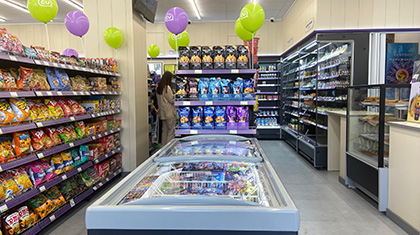Global consumer confidence has plummeted to a record new low in the past six months, falling seven Index points down fr om 84 to 77 according to the latest twice-yearly Nielsen Global Consumer Confidence Index which tracks consumer confidence, major concerns and spending habits among 25,420 internet users in 50 countries, including Russia.
The latest Nielsen Global Consumer Confidence Survey, conducted 19 March – 2 April 2009, found that the emerging markets of Russia, UAE, and Brazil suffered the biggest falls in consumer confidence over the past six months as currency devaluation, weakening export markets and falling global commodity prices took their toll. “While consumer confidence in Europe and developed markets tumbled dramatically between May and October 2008, in recent months the emerging markets of Russia and Latin America have been hit hardest,” said James Russo, Vice President, Global Consumer Insights, The Nielsen Company.
Consumer confidence plummeted by 29 Index points in Russia (down to 75 points fr om 104 in September/October ‘08), marking the biggest fall in consumer confidence tracked by Nielsen globally and in the market. Consumer confidence in key emerging markets of UAE and Brazil both fell by 21 points.
Regionally, Latin America suffered the biggest consumer confidence hit, falling 15 Index points (down to 82 points fr om 97) while consumer confidence in Europe and Asia Pacific both fell by seven Index points.
In the Nielsen survey, consumer confidence in Brazil fell fr om 108 index points to 87 points, while Argentina dropped fr om 94 to 78 index points. “While the effects of the global downturn are unlikely to impact consumers in the BRIC and Latam countries as much as those in deve loped countries, these markets are now experiencing a marked slowdown in contrast to recent years of boom and growth,” said Russo.
According to the OECD, GDP in Brazil is expected to decline by 0.3 percent this year, while the IMF just estimated that growth in UAE will slow to 3.3 percent in 2009 compared to a previous estimate of 7.4 percent last year.
In Russia, the economy contracted for the first time in a decade and GDP is estimated to fall by 5.6 percent this year. “Towards the end of last year, Russian consumers had taken a ‘wait and see attitude to the global economic woes, which have since taken an aggressive swing downwards. Continued depressed oil prices, devalued currency and local slow down took hold in many sectors, and brought back memories of the Russian crisis of 1998,” added Dwight Watson, Managing Director, The Nielsen Company, Russia.
Today Asia Pacific seems to be the most optimistic region in the world. Indonesia topped Nielsen s Global Consumer Confidence Index at 104 points, followed by Denmark (102 points) and India (99 points). The world s most pessimistic nations in the Nielsen Index are Korea (31 points), followed by Portugal and Latvia at 48 Index points. Confidence fell in 49 out of 50 countries – Taiwan was the only country to buck the global trend, edging up three Index points fr om 60 to 63, although still 14 points below the global average.
“Global consumers have been battered and bruised by a constant onslaught of bad news in the last six months,” said Russo. “Daily announcements of job cuts and company profit warnings, bankruptcies and foreclosures, lowered GDP expectations and depressed manufacturing and production forecasts have combined to reduced consumer confidence and spending power to their lowest levels in post-war years.
In the last six month, consumer confidence in the regions of Middle East/Africa and North America both declined by two and three index points respectively. However, no significant further decline in North American consumer confidence may signal the first cautious signs of hope that the recession is finally bottoming out.
“The results we are seeing in the latest Nielsen Consumer Confidence Index indicate that we may be at, or at least very near, a bottom in this economic cycle. Specifically in the United States, while clearly adjusting their spending and savings with 40 percent stating they are paying off debts and putting into savings, American consumers are increasingly optimistic about a light at the end of the tunnel, with close to 20 percent seeing a recovery in the next 12 months,“ commented Russo.
“While this is still below the global average of 23 percent who see a recovery coming in the next 12 months, it is an increase on our October 2008 results. The Nielsen Consumer Confidence data becomes yet another datapoint - along with retail sales gains in Jan and Feb, stock market advances in March, improving housing conditions and loosening up of the credit market - to show we may have turned a corner. Critical to a recovery is a change in sentiment, and there is evidence to support this trend as companies plan for a recovery,” added Russo.
Europe remained the world s most pessimistic region at 70 index points, seven points below the global average, a clear indication that economic recovery in Europe will be longer and slower to take effect. Within Europe, consumer confidence in Hungary suffered the biggest fall by 19 Index points, followed by Latvia (-17 points) and Finland (-15 points).
According to the Nielsen survey, 77 percent of online consumers think their economy is in recession, compared to 63 percent who thought so six months ago.
“Overall, consumers experienced a grim end to 2008 and braced themselves for a tough first half of 2009, which is what they are getting. The one exception globally is China where 65 percent of internet consumers thought their economy not currently in a recession,” said Russo.
“The Central Government s stimulus package of US$585 billion equates to 13.3 percent of GDP and is an enormous shot in the arm for Chinese consumer confidence,” said Chris Morley, Managing Director, The Nielsen Company, China.
“While China s economy has undoubtedly slowed, February retail sales are still 15 percent up on last year and many Chinese Consumers now believe the next 12 months could be a good time to go back to investing in stocks and property. Chinese consumers are also maintaining their love affair with travel during the economic slowdown and top the list of markets surveyed by Nielsen when it comes to their intention to spend spare cash on travel,” added Morley.
Among global online consumers who believe they re currently in recession, 52 percent said they were bracing themselves for a global recession to last 12 months or longer. “One in two consumers isn t expecting any miracles for a quick rebound – steady but stable is probably the best approach they are hoping for,” said Russo.
Not everyone is prepared to suffer a prolonged recession however – some consumers are already planning their post-recession party. Among current recessionistas, nearly one in five (23%) online consumers believes their country will be out of recession within the next 12 months, spearheaded by the Vietnamese (60%) and Indians (56%). Two in five Danish and Dutch consumers also believe they ll be out of recession within a year, along with one in three Austrians, Swedes, Norwegians, Russians, Indonesians, Israelis, Mexican and UAE consumers.
While global consumer confidence plummeted to a new low, fears of unemployment and job uncertainly reached new heights. Job security was cited as the leading concern among internet consumers in 31 of 50 countries surveyed. Global concern for job security rose to 22 percent globally from nine percent in the latest round of the survey.
«Six months ago, global consumers including Russians cited the economy and work/life balance as their two top concerns in life - but consumers priorities have rapidly changed along with the economic deterioration,” said Dwight Watson. “With record global redundancies affecting every industry, the economy and job security have eclipsed all other concerns in life today,” said Watson.
Consumers who cited job security as their top concern in life today include China (29%), Hong Kong (33%), India (29%), Singapore (32%), Vietnam (36%), Italy (24%), Spain (34%), Hungary (31%) and Mexico (29%).
Uncertainty in the labour force also remains a worry for the near future. One in five (26%) global consumers described their job prospects in the next 12 months as bad compared with 17 percent in October 2008. Seventy-eight percent of Latvians said job prospects were bad for the next 12 months, along with 74 percent of Koreans, 60 percent of Japanese and 42 percent of British consumers.
In Russia 29% of online consumers consider their job prospects as bad. In total the number of pessimists those who think their prospects on the labour market as not so good and bad has grown up to 84percent.
About The Nielsen Company
The Nielsen Company is a global information and media company with leading market positions in marketing and consumer information, television and other media measurement, online intelligence, mobile measurement, trade shows and business publications (Billboard, The Hollywood Reporter, Adweek). The privately held company is active in more than 100 countries, with headquarters in New York, USA. For more information, please visit, www.nielsen.com










